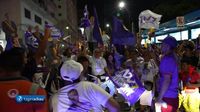In a significant political development, Daniel Noboa has retained his position as President of Ecuador, securing a decisive victory in the runoff election held on April 13, 2025. The liberal-conservative incumbent garnered 55.9 percent of the votes, defeating left-wing candidate Luisa González, who received 44.1 percent. Despite the clear outcome, the election results have been met with controversy, as González has refused to accept the legitimacy of the election, alleging electoral fraud and demanding a recount.
González, affiliated with the political camp of former President Rafael Correa, expressed her disbelief in the results during a rally with her supporters. "We demand a new count and that the ballot boxes be opened," she declared, emphasizing her refusal to believe that the populace would prefer a "lie over the truth," as reported by various news outlets including Deutsche Welle.
Noboa, on the other hand, asserted the historic nature of his victory, stating, "This victory was historic—a win with more than ten percentage points ahead, a victory with over a million votes. There is no doubt about who the winner is," according to Reuters. His confidence stands in stark contrast to the doubts raised by his opponent, highlighting a growing divide in Ecuadorian politics.
The election comes at a time when Ecuador is grappling with a severe security crisis, marked by escalating violence and drug-related crime. Noboa had previously declared a state of emergency in January 2025, responding to a wave of violent incidents linked to organized crime. The declaration allowed for increased military presence in the streets and prisons, with the government aiming to combat the powerful drug gangs that have made Ecuador a key transit point for cocaine shipments to Europe and Asia.
As Noboa takes on his second term, he faces immense challenges. The country has been in recession since 2023, with rising poverty and unemployment rates. Many Ecuadorians are leaving the country in search of better opportunities, with emigration levels reaching a 15-year high. The International Monetary Fund (IMF) has projected a modest growth of only 1.2 percent for the current year, insufficient to alleviate the economic hardships faced by the populace.
Noboa, who first assumed the presidency in October 2023 at the age of 35, made history as the youngest democratically elected head of state in Ecuador. His initial rise to power was facilitated by the unexpected resignation of his predecessor, Guillermo Lasso, who dissolved Congress and called for early elections. Noboa's tenure has been marked by a commitment to addressing crime and improving security, yet the effectiveness of his policies remains under scrutiny.
The political landscape in Ecuador has shifted dramatically in recent years, with Noboa's administration facing criticism for its handling of the ongoing security crisis. The country, once considered relatively safe, now contends with one of the highest murder rates in South America. The presence of drug cartels has intensified, with these criminal organizations increasingly utilizing Ecuador's ports for drug trafficking.
In the lead-up to the election, Noboa's campaign capitalized on his perceived strength in combating crime, positioning himself as a more reliable candidate than González, who was accused of negotiating with drug lords. Additionally, her proposal to strengthen ties with Venezuela—an authoritarian regime from which many Ecuadorians have fled—may have further alienated voters.
Despite the election outcome, the political atmosphere remains tense. González's refusal to accept the results has sparked concerns about potential unrest, as her supporters rally behind her claims of fraud. International observers were present during the election process, and their final report is anticipated to shed light on the conduct of the elections.
As Noboa prepares to govern for another term, he must navigate the turbulent waters of a nation in crisis. The dual challenges of rampant crime and economic instability will require decisive leadership and innovative solutions. His administration's ability to effectively address these pressing issues will be crucial in determining the future stability of Ecuador.
In summary, the re-election of Daniel Noboa marks a pivotal moment in Ecuadorian politics, underscored by a contentious electoral process and significant socio-economic challenges. As the nation watches closely, the coming months will reveal whether Noboa can fulfill his promises and restore faith in governance amid widespread discontent.









